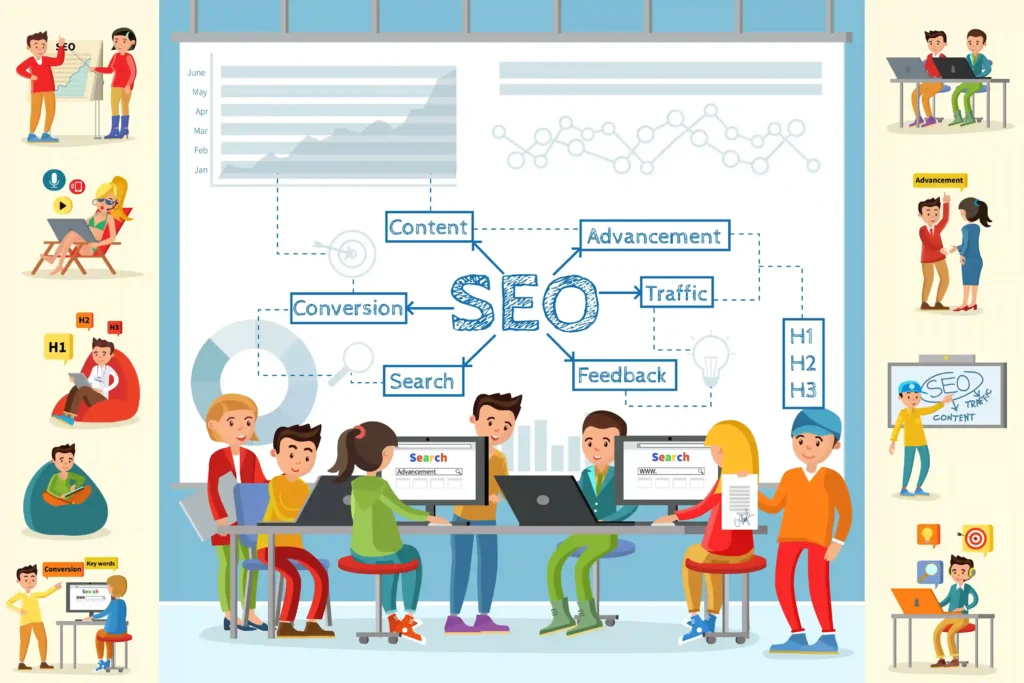What Does SEO Mean in Marketing? A Comprehensive Guide to SEO in Digital Marketing
ghifari
August 17, 2024
7 min read

In the world of digital marketing, “SEO” is a term that’s frequently mentioned, yet not always fully understood. If you’re delving into online business or marketing, you may have heard about the importance of SEO but might not be entirely clear on what it entails. This article will break down what SEO means in marketing, why it’s crucial for your business, and how you can leverage it to enhance your online presence.
Understanding SEO: The Basics
SEO stands for Search Engine Optimization. It refers to the practice of optimizing your website and its content so that it ranks higher in search engine results pages (SERPs) like Google, Bing, and Yahoo. The higher your site ranks, the more visible it becomes to potential customers.
When people search for information, products, or services online, they typically don’t scroll past the first few results. In fact, studies show that the first page of Google captures over 90% of search traffic. If your website isn’t on that first page, you’re missing out on a significant amount of potential traffic—and that’s where SEO comes in.
How SEO Fits Into Digital Marketing
SEO is a critical component of digital marketing. While digital marketing encompasses various strategies to promote a brand online—such as social media marketing, email marketing, content marketing, and pay-per-click (PPC) advertising—SEO is unique because it focuses on organic traffic.
Organic traffic refers to visitors who find your website through unpaid search engine results. Unlike paid advertising, which can deliver immediate results but stops working the moment you stop paying, SEO is a long-term investment that, when done correctly, continues to bring traffic over time.
The Key Elements of SEO
SEO is multifaceted and involves several key elements that work together to improve your website’s ranking. These elements include:
1. Keyword Research
Keywords are the terms and phrases that people type into search engines when looking for information. Effective SEO starts with understanding what your potential customers are searching for and optimizing your content around these keywords.
For instance, if you run an online store selling eco-friendly products, you might want to target keywords like “sustainable products,” “eco-friendly home goods,” or “green living tips.” Tools like Google Keyword Planner, Ahrefs, and SEMrush can help you discover relevant keywords with good search volume.
Read Also:
How to Find the Right Keywords for SEO: A Comprehensive Guide
2. On-Page SEO
On-page SEO involves optimizing the content and structure of your website’s pages to make them more search-engine-friendly. This includes:
- Title Tags: The title of your page that appears in search results. It should include your main keyword and be compelling enough to encourage clicks.
- Meta Descriptions: A brief description of your page’s content. Although not a direct ranking factor, a well-written meta description can improve your click-through rate (CTR).
- Header Tags: Use of H1, H2, H3 tags to structure your content and highlight important sections. This helps both users and search engines understand the hierarchy of your content.
- URL Structure: Clean and descriptive URLs that include keywords can help search engines understand what your page is about.
- Internal Linking: Linking to other relevant pages on your site can help search engines crawl your website more effectively and keep users engaged longer.
- Image Optimization: Including alt text with your images, which not only helps with SEO but also improves accessibility.
3. Technical SEO
Technical SEO ensures that your website meets the technical requirements of modern search engines. This includes:
- Site Speed: Search engines prioritize fast-loading websites. Tools like Google PageSpeed Insights can help you identify and fix speed issues.
- Mobile-Friendliness: With more than half of all internet traffic coming from mobile devices, having a mobile-responsive design is crucial.
- Crawlability: Search engines use bots to crawl your website and index its content. Ensuring that your site is easy to crawl (using a sitemap, clean code, etc.) is key to good SEO.
- HTTPS: Having a secure website (indicated by HTTPS rather than HTTP) is a ranking factor, as search engines favor secure sites.
4. Content Creation
Content is the backbone of SEO. Creating high-quality, relevant, and engaging content is essential for attracting and retaining website visitors. This could include blog posts, articles, videos, infographics, and more.
The key to successful content creation is to focus on providing value to your audience. Instead of writing content just to fill pages, think about the questions and problems your audience has, and create content that answers those questions or solves those problems.
5. Off-Page SEO
Off-page SEO refers to actions taken outside of your website to improve its authority and ranking. The most important aspect of off-page SEO is backlinking—getting other reputable websites to link to your content.
Backlinks act as votes of confidence from other sites, signaling to search engines that your content is trustworthy and valuable. However, not all backlinks are created equal. Quality matters more than quantity, so focus on earning links from high-authority, relevant sites.
Other off-page SEO strategies include social media marketing, influencer outreach, and online reviews, all of which can indirectly impact your search engine rankings.
Why SEO Matters for Your Business
SEO is not just about attracting more visitors to your website—it’s about attracting the right visitors. When your site ranks for relevant keywords, you’re more likely to attract users who are already interested in what you have to offer, increasing your chances of converting them into customers.
Here are some key reasons why SEO should be a priority for your business:
- Increased Visibility: The higher your site ranks, the more visible it becomes to potential customers.
- Credibility and Trust: Websites that appear at the top of search results are often perceived as more credible and trustworthy.
- Cost-Effectiveness: Compared to paid advertising, SEO is a cost-effective way to drive traffic over the long term.
- Better User Experience: Good SEO practices also improve the overall user experience on your site, making it easier for visitors to find what they’re looking for.
- Competitive Advantage: In a competitive market, businesses that invest in SEO have a significant edge over those that don’t.
How to Get Started with SEO
Starting with SEO can seem overwhelming, especially if you’re new to digital marketing. However, the key is to take it step by step. Here’s a simple roadmap to get you started:
- Conduct a Website Audit: Assess your current website to identify any technical issues, gaps in content, or areas for improvement.
- Keyword Research: Identify the keywords that are relevant to your business and have good search volume.
- Optimize Your Website: Implement on-page and technical SEO improvements based on your audit and keyword research.
- Create Valuable Content: Start producing high-quality content that addresses the needs and interests of your audience.
- Build Backlinks: Reach out to other websites and industry influencers to earn high-quality backlinks.
- Monitor and Adjust: SEO is not a one-time effort. Use tools like Google Analytics and Search Console to monitor your performance and make adjustments as needed.
Conclusion: SEO as a Core Component of Your Digital Marketing Strategy
SEO is a vital part of any digital marketing strategy. It not only helps you attract more visitors but also ensures that those visitors are more likely to be interested in your products or services. By investing in SEO, you’re setting your business up for long-term success in the competitive online marketplace.
If you’re looking to improve your SEO but don’t know where to start, or if you simply don’t have the time to manage it yourself, consider partnering with an expert. At AvailableDev, we offer comprehensive SEO services tailored to your business’s unique needs. Let us help you increase your visibility, drive more traffic, and achieve your digital marketing goals. Contact us today to learn more about how we can support your SEO efforts!
Related Article
How to Find the Right Keywords for SEO: A Comprehensive Guide
In the world of digital marketing, Search Engine Optimization (SEO)... In the world of digital marketing, Search Engine Optimization (SEO) is essential for driving organic traffic to your website. However,...
What is White Label SEO?
In today’s digital age, having a strong online presence is... In today’s digital age, having a strong online presence is crucial for businesses of all sizes. Search Engine Optimization (SEO)...
How to Sell SEO: A Comprehensive Guide
In today’s digital age, Search Engine Optimization (SEO) has become... In today’s digital age, Search Engine Optimization (SEO) has become a crucial component for businesses aiming to enhance their online...




